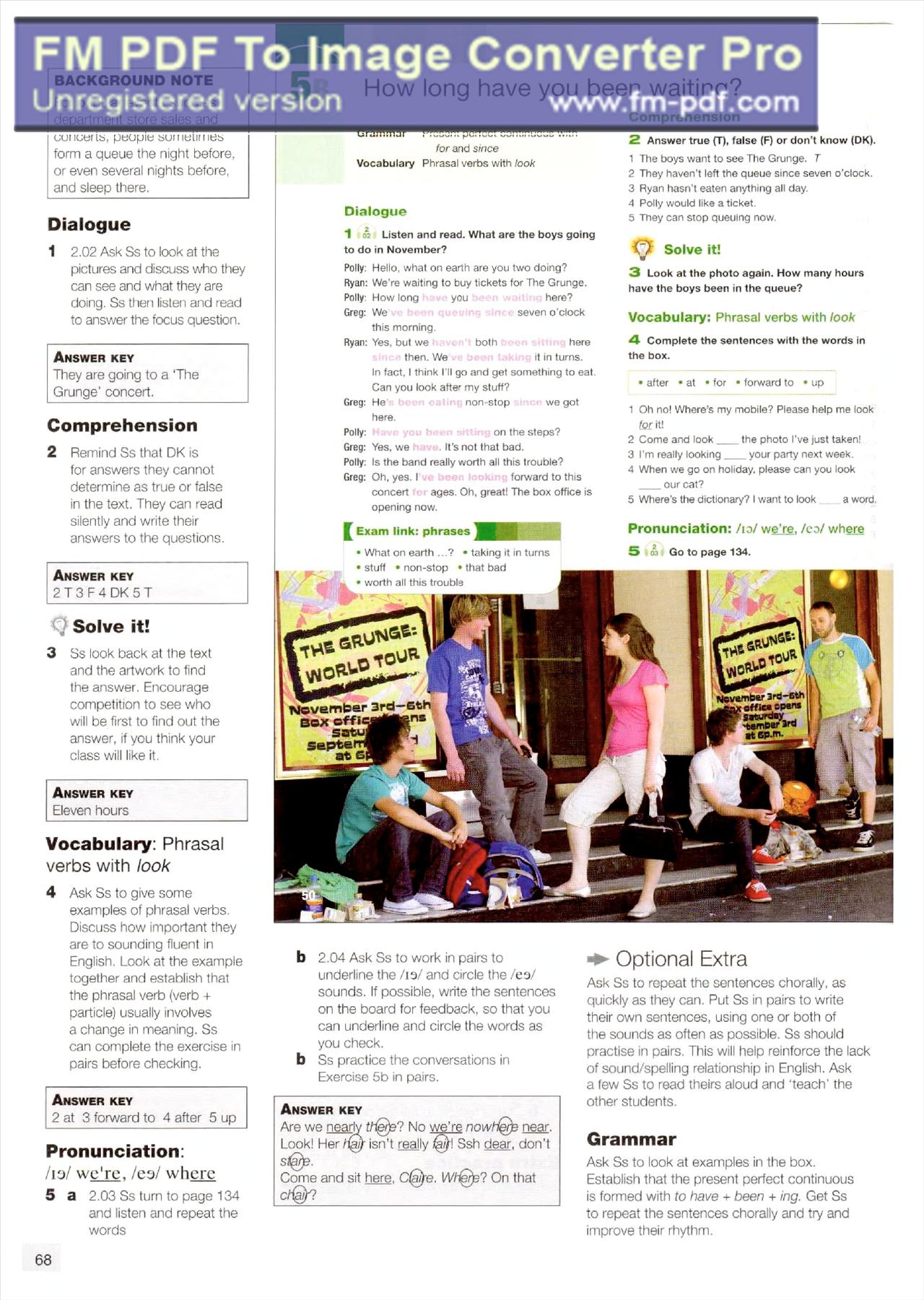Up¾at 3 Teacher's Book podrecznik nauczyciela plus odpowiedzi ,testy,klucz answer key Page 067


BACKGROUND NO

• II*
(junceiis, peopie sumelirnes form a queue the mght before. or even several nights before, and sleep there.
• WWW* • I i^Ml
for and sińce
Yocabulary Phrasal verbs with look
Dialogue
1 2.02 Ask Ss to look at the pictures and discuss who they can see and what they are doing. Ss then listen and read to answer the focus question.
Answer key
They are going to a 'The
Grunge' concert.
Comprehension
2 Remind Ss that DK is for answers they cannot determine as true or false in the text. They can read silently and write their answers to the questions.
Answer key
2T3F4DK5T_
O Solve it!
3 Ss look back at the text and the artwork to find the answer. Encourage competition to see who will be first to find out the answer, if you think your class will like it.
Vocabulary: Phrasal verbs with look
4 Ask Ss to give some examples of phrasal verbs. Discuss how important they are to sounding fluent in English. Look at the example together and establish that the phrasal verb (verb + particie) usually involves a change in meaning. Ss can complete the exercise in pairs before checking.
Dialogue
1 o2? Listen and read. What are the boys going to do in November?
Polly: Hello, what on earth are you two doing?
Ryan: We're waitmg to buy tickets for The Grunge. Polly: How long you here7
Greg: We seven oclock
this morning.
Ryan: Yes. but we both here
then. We it in turns.
In fact. I think I II go and get something to eat. Can you look aft er my stuff?
Greg: He non-stop we got
here.
Polly: on the steps?
Greg: Yes. we . It’s not that bad.
Polly: Is the band really worth all this trouble?
Greg: Oh. yes. I forward to this
concert ages. Oh. great! The box Office is opening now.
[ Exam link: phrases j||
• What on earth ...? • taking it in turns
2 Answer true (T), false (F) or dorft know (DK).
1 The boys want to see The Grunge. T
2 They haven’t left the queue sińce seven o’clock.
3 Ryan hasn t eaten anything all day.
4 Polly would like a ticket.
5 They can stop gueumg now.
3 Look at the photo again. How many hours have the boys been in the queue?
Vocabulary: Phrasal verbs with look
Complete the sentences with the words in the box.
• after • at • for • forward to • up
1 Oh no! Where's my mobile? Please help me look (QÅ„t!
2 Come and look_the photo l’ve just taken!
3 l’m really lookmg_your party next week.
4 When we go on holiday. please can you look _our cat?
5 Where's the dictionary? I want to look a word.
Pronunciation: /io/ we're. /co/ where 5 03 Go to page 134.
• stuff • non-stop • that bad
• worth all this troubla
b 2.04 Ask Ss to work in pairs to underline the /io/ and circle the /eo/ sounds. If possible, write the sentences on the board for feedback, so that you can underline and circle the words as you check.
b Ss practice the conversations in Exercise 5b in pairs.
Answer key
Are we nearly trięfe? No wełre nowrięrp near. Look! Her r(ę) isn’t really (ąj}\ Ssh dear, don't
Come and sit here. C^e. WHęrfi? On that
Optional Extra
Ask Ss to ropeat the sentences chorally, as quickly as they can. Put Ss in pairs to write their own sentences, using one or both of the sounds as often as possible. Ss should practise in pairs. This will help reinforce the lack of sound/spelling relationship in English. Ask a few Ss to read theirs aloud and ‘teach’ the other students.
Grammar
Ask Ss to look at examples in the box.
Establish that the present perfect continuous is formed with to have + been + ing. Get Ss to repeat the sentences chorally and try and improve their rhythm.
68
Wyszukiwarka
Podobne podstrony:
Up?at 3 Teacher s Book podrecznik nauczyciela plus odpowiedzi ,testy,klucz answer key Page 078 e Con
Up?at 3 Teacher s Book podrecznik nauczyciela plus odpowiedzi ,testy,klucz answer key Page 103 Get s
Up?at 3 Teacher s Book podrecznik nauczyciela plus odpowiedzi ,testy,klucz answer key Page 001 FM PD
Up?at 3 Teacher s Book podrecznik nauczyciela plus odpowiedzi ,testy,klucz answer key Page 005 Conte
Up?at 3 Teacher s Book podrecznik nauczyciela plus odpowiedzi ,testy,klucz answer key Page 006 Conte
Up?at 3 Teacher s Book podrecznik nauczyciela plus odpowiedzi ,testy,klucz answer key Page 009 FM PD
Up?at 3 Teacher s Book podrecznik nauczyciela plus odpowiedzi ,testy,klucz answer key Page 010 : Rea
Up?at 3 Teacher s Book podrecznik nauczyciela plus odpowiedzi ,testy,klucz answer key Page 012 Large
Up?at 3 Teacher s Book podrecznik nauczyciela plus odpowiedzi ,testy,klucz answer key Page 013 u mfo
Up?at 3 Teacher s Book podrecznik nauczyciela plus odpowiedzi ,testy,klucz answer key Page 014 selec
Up?at 3 Teacher s Book podrecznik nauczyciela plus odpowiedzi ,testy,klucz answer key Page 015 MMMMM
więcej podobnych podstron